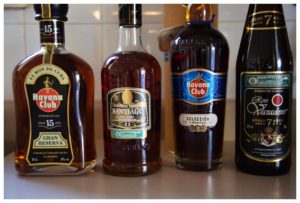by WorldTribune Staff, December 20, 2016
Cash-strapped Cuba has proposed paying off a large Cold War-era debt to the Czech Republic with rum.
Cuba owes some $270 million to the former Czechoslovakia, Havana’s ally during the Cold War.
 There’s no word on whether the Czechs are going to take the deal. Czech Finance Ministry spokesman Michal Zurovec said last week that Prague would prefer at least some of the debt to be returned in cash.
There’s no word on whether the Czechs are going to take the deal. Czech Finance Ministry spokesman Michal Zurovec said last week that Prague would prefer at least some of the debt to be returned in cash.
The Czech Republic imported about $2 million worth of rum from Cuba last year, according to the European nation’s statistics office. At that rate, it would probably take more than a century for Czechs to drink the booze coming their way if it was used to pay off Cuba’s entire debt.
The Cuban government has also proposed another option, repaying the debt in pharmaceutical drugs. Havana’s drugs, however, lack European Union certification and, hence, “repaying with a more traditional medicine,” probably referring to Cuba’s rum, seems like a more plausible option, the BBC reported.
Here are three other instances in which distressed borrowers proposed odd swaps to pay off debt:
- In 2010, North Korea sought to settle 5 percent of its $10 million in debt to the Czech Republic with ginseng, according to the Financial Times. During the Cold War, Czechoslovakia was one of the Asian nation’s largest equipment suppliers. Czech officials balked at the offer; they wanted zinc instead.
- Russia offered a nuclear submarine and two MiG fighter jets to New Zealand in 1993 to pay $100 million it owed for imported dairy products, according to a book on the industry by Clive Lind titled “Till the Cows Came Home.” Jim Bolger, then New Zealand’s prime minister, declined the second-hand military hardware. New Zealand later secured periodic payments from Russia totaling roughly a third of the debt, the Guardian reported.
- In 2010, the Dominican Republic agreed to send black beans, pasta and sugar in exchange for Venezuelan crude oil shipments. The following year, Guyana shipped Venezuela 170,000 metric tons of rice and Nicaragua sent an assortment of goods that included meat, milk and 20,000 pairs of pants. Meanwhile, Cuba compensates Venezuela by sending doctors, military advisers and teachers the other way.
